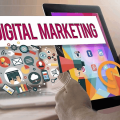
Keeping up with the ever-changing landscape of digital marketing is crucial. Whether you’re a seasoned professional or just starting out in the field, understanding the common pros and cons of digital marketing will help you strategize what’s best for your brand.
Recent digital marketing statistics show that the industry will continue to grow, with more businesses transitioning to online platforms.
Digital ad spending also continues to rise, according to a report by eMarketer, and is expected to reach $517.51 billion in 2023. The numbers are a big jump from those of previous years.
Mobile dominance is also at an all-time high, accounting for a significant portion of internet traffic, and is expected to surpass $300 billion by 2024.
This is why social media advertising is on the rise, with platforms like Facebook and Instagram being popular choices for marketers, driving engagement and conversions.
As such, it’s important to weigh the pros and cons of digital marketing to ensure that you’re making informed decisions that align with your brand’s goals.
The Pros of Digital Marketing
The many benefits of digital marketing are enough to encourage you to keep improving your strategies. Here are the top 5 benefits that digital marketers and business website owners need to know about:
- Increased Reach and Targeting
Digital marketing breaks down geographical barriers, and digital marketing allows us to reach audiences we never could have before. Small businesses can expand their reach internationally, and even start-ups can compete with established brands on a global scale.
For example, Airbnb’s digital marketing strategy allowed them to expand to over 220 countries, connecting travelers with unique accommodations worldwide.
In addition, with the right targeting tools, we can identify and market to our ideal customer, increasing our conversion rates and return on investment. Through data-driven strategies and tools like social media analytics and Google Ads, you can tailor your messages to reach the right people at the right time.
For instance, a local bakery can target its Facebook ads to users within a 10-mile radius, promoting special offers to nearby customers.
- Cost-Effective Efforts
Compared to traditional marketing methods, digital marketing is often more cost-effective. With pay-per-click (PPC) advertising, for instance, you only pay when someone clicks on your ad, reducing waste.
On the other hand, social media advertising can be done on a relatively small budget, and the return on investment can be significant.
In addition, according to a study by HubSpot, inbound marketing, or digital marketing strategy, costs 62% less per lead than traditional outbound marketing.
- Data-Driven Strategies
Digital marketing is data-driven, providing us with insights and metrics that allow us to make informed decisions. Platforms such as Google Analytics, Facebook Insights, and Twitter Analytics can help you track engagement rates, conversion rates, and other key performance indicators (KPIs) to optimize your campaigns.
Using data-driven strategies helps marketers develop more effective strategies that align with their brand’s goals. Moreover, data can also be used to create personalized experiences for customers.
By leveraging data in this way, brands can boost customer loyalty and trust by building relationships through personalization.
- Measurable Results
One of the standout advantages of digital marketing is its ability to track and measure performance in real-time. Metrics like click-through rates (CTR), conversion rates, and return on investment (ROI) allow you to assess the effectiveness of your campaigns.
For instance, e-commerce giant Amazon uses comprehensive analytics to fine-tune its advertising efforts, optimizing product listings and advertising spend.
- Flexible and Adaptable Campaigns
One of the key advantages of digital marketing is its flexibility and adaptability. Because it’s so easy to adjust digital campaigns, they can quickly respond to changes in the market and customer preferences. This flexibility allows us to stay on top of trends and optimize our strategies for maximum results.
For example, companies can use A/B testing to compare different versions of a web page or email campaign to determine which one resonates best with customers. This helps marketers tweak their messages and increase conversion rates without having to completely redesign their campaign.
- Direct Engagement
Digital marketing allows companies to engage directly with their target audience. This direct engagement is essential for creating relationships with customers and maintaining loyalty. With the right strategies, businesses can start conversations with their customers, increasing customer satisfaction, trust, and loyalty.
Social media platforms are a great way to reach out to your audience and interact with them on a more personal level. Brands can use social media posts, contests, polls, and more to connect with customers in real-time while also building relationships over time.
These are just a few of the many pros that come along with digital marketing. When used strategically and creatively, digital marketing can be an invaluable asset for any business looking to increase its reach and build better relationships with its customers.
- Increased Brand Awareness
Digital marketing offers many advantages for to build brand awareness and increase it. By reaching audiences on social media, websites, and beyond, we can spread the word about our products and services.
As you reach a global audience, you can foster brand loyalty through personalization and storytelling. By optimizing for search engines and using paid advertising across platforms, businesses can amplify their messages and reach specific audiences effectively.
In addition, collaborating with influencers also taps into their audience base, increasing brand exposure and awareness.
The Cons of Digital Marketing
While digital marketing has its advantages, there are also some potential drawbacks to consider. Here are some of the most common cons of digital marketing:
- Limited Personal Interaction
Digital marketing relies on technology to communicate with customers, which can limit personal interactions and make it difficult to build relationships with your audience.
Despite the potential negative effects of ad blockers, there are some strategies that marketers can use to improve the success of their campaigns in spite of this obstacle.
These include creating compelling content that encourages engagement and conversions, optimizing landing pages for mobile devices, using retargeting techniques to target users who have already interacted with your brand, leveraging social media platforms for organic reach, utilizing influencer marketing for increased visibility, and focusing on the user experience by making sure your website is fast and easy to navigate.
- Heightened Competition
The digital marketing landscape is becoming more competitive every day, as brands scramble to find new ways to stand out. Brands must use creative strategies to beat the competition and gain visibility in such a crowded space.
Techniques like search engine optimization (SEO), content marketing, influencer marketing, and email campaigns can help brands achieve success in this highly competitive arena.
- Costly Mistakes
As with any form of advertising, it’s important to have a thorough understanding of the medium before diving in headfirst. Digital marketing mistakes can be costly and even irreversible if not done correctly. For this reason, it’s essential that marketers have a solid plan in place before launching any campaigns and take the time to monitor and adjust their strategies as needed.
- Difficulty Measuring ROI
Although digital marketing offers many advantages over traditional forms of advertising, it can be difficult to measure ROI accurately. This is because it’s harder to track which channels are driving conversions and how much each channel is contributing to overall sales or leads.
To combat this issue, marketers should focus on tracking customer behavior across all stages of the funnel and use analytics tools like Google Analytics to measure conversion rates accurately.
- Technology Limitations
Technology is constantly evolving, but sometimes digital marketing tools don’t keep up with these advancements quickly enough – leading to compatibility issues and limited options for optimizing campaigns.
Additionally, hardware limitations can prevent marketers from achieving their desired results – such as slow loading times or difficulty accessing certain websites or apps due to outdated technology or data usage restrictions.
- Cybersecurity Risks
Digital marketing also poses potential cybersecurity risks for brands that aren’t prepared for them – particularly if they collect customer data through online forms or other methods that aren’t encrypted properly.
By investing in secure hosting solutions, implementing two-factor authentication processes, and regularly updating software versions, businesses can reduce the risk of cyberattacks and protect their customers’ data.
- Ad Blockers
Ad blocking is a growing phenomenon that can significantly reduce the impact of digital marketing campaigns. Ad blockers prevent online advertisements from displaying, which reduces the effectiveness of digital marketing campaigns and limits their reach.
Ad blockers also raise privacy concerns, as they can collect data on users’ browsing habits and target them with personalized ads.
Many internet users install ad blockers, which can reduce the effectiveness of your digital marketing campaigns and limit your reach.
Conclusion
Despite the cons of digital marketing, it is still a powerful tool when used correctly. By leveraging the right technology and strategies, companies can maximize their reach and create successful campaigns that drive results.
It is important to remember that no single strategy works for all businesses, so it is important to analyze customer behavior and preferences, optimize campaigns for mobile devices, and always measure ROI accurately in order to make informed decisions about which digital marketing tactics are best suited for your organization’s goals.
Author Bio: Mayleen Meñez is a digital marketing and SEO and Content Manager for Softvire, with a background in film, multimedia, and digital marketing, but a true passion for community development work in the Philippines and Asia. Read more from Mayleen now!






